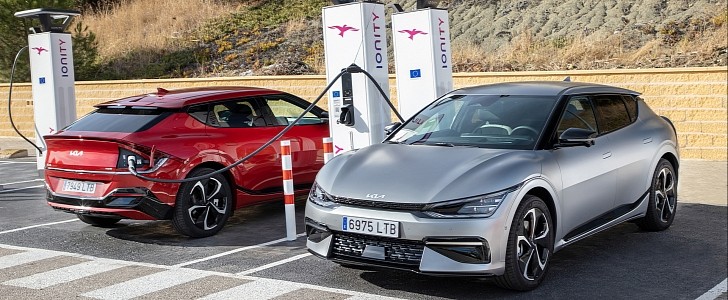One issue that hinders electric vehicle adoption is the time needed to fill a battery. Right now is around half an hour for the fastest-charging EVs. Scientists think this time can be significantly reduced by tweaking the charging algorithms.
When talking about electric vehicles, many believe that the bigger the range, the better. A straightforward way to improve range is to install a bigger battery. But this significantly adds to the sticker price and makes replenishing the battery a slow and long pain unless a fast-charging station is available. Even so, filling an EV’s battery takes around half an hour for the most advanced models. This is much more than the average Joe needs to fill up his truck’s tank and hit the road for the next leg of his journey.
The best EVs use an 800-volt electric system to maximize power intake and can charge with up to 350 kW of power. This could, in theory, fill a 70 kWh battery in a little more than 10 minutes. It doesn’t happen like that in practice because the car would only use its full power for a limited amount of time. Heat and safety considerations limit the current when the battery is almost empty or full. That’s why an EV charges the fastest, between 20% and 80%. Charging the last 20% of the battery takes almost as long as it took to get to 80%.
Scientists work on improving the charging algorithms to allow an EV to get more time with the higher power. It is pretty much what phone makers do to allow an insane amount of energy to fast-charge a phone in 10 minutes or less. Eric Dufek from the Idaho National Laboratory and his colleagues use artificially intelligent algorithms to learn how altering various charging parameters impacts battery aging over time.
Using this method, the team devised a new protocol that can charge an EV’s battery from zero to 90% in 10 minutes while protecting the battery’s long-term health. Their algorithm was modeled on a computer, but the results were verified on actual batteries, and they are confident it can work. Being basically a software change in how the car controls charging, it would be easy to implement in existing EV models. As one of the team members puts it, it’s “improvement with no cost,” made possible by using existing technology and infrastructure.
The best EVs use an 800-volt electric system to maximize power intake and can charge with up to 350 kW of power. This could, in theory, fill a 70 kWh battery in a little more than 10 minutes. It doesn’t happen like that in practice because the car would only use its full power for a limited amount of time. Heat and safety considerations limit the current when the battery is almost empty or full. That’s why an EV charges the fastest, between 20% and 80%. Charging the last 20% of the battery takes almost as long as it took to get to 80%.
Scientists work on improving the charging algorithms to allow an EV to get more time with the higher power. It is pretty much what phone makers do to allow an insane amount of energy to fast-charge a phone in 10 minutes or less. Eric Dufek from the Idaho National Laboratory and his colleagues use artificially intelligent algorithms to learn how altering various charging parameters impacts battery aging over time.
Using this method, the team devised a new protocol that can charge an EV’s battery from zero to 90% in 10 minutes while protecting the battery’s long-term health. Their algorithm was modeled on a computer, but the results were verified on actual batteries, and they are confident it can work. Being basically a software change in how the car controls charging, it would be easy to implement in existing EV models. As one of the team members puts it, it’s “improvement with no cost,” made possible by using existing technology and infrastructure.






